This report provides a detailed exploration of the technical architecture, innovative mechanisms, and unique value propositions of the Monad native liquid staking protocol.
Author: Harvey C
Monad Ecosystem Guide Series (Introduction to native projects within the Monad ecosystem)
Monad Ecosystem Guide: Native DEX/Perp Preview
Monad is a high-performance, EVM-compatible Layer 1 blockchain characterized by high throughput and low latency. Its technical foundation addresses long-standing issues in traditional staking, such as limited liquidity and low capital efficiency, by supporting the development of innovative liquid staking solutions, providing users with a more efficient staking experience.
The native liquid staking projects within the Monad ecosystem, including Magma, Kintsu, and aPriori, leverage Monad's unique architecture to offer advanced features and achieve seamless integration. These protocols aim to enhance liquidity, improve staking efficiency, and provide users with a more user-friendly staking experience.
Magma plans to introduce a DAO-based liquid staking protocol that enhances security and decentralization through Distributed Validator Technology (DVT) and extends its application beyond existing implementations on Ethereum. Kintsu focuses on composability, aiming to enable staked assets to interact with and participate in DeFi applications within the Monad network. Meanwhile, aPriori integrates Miner Extractable Value (MEV) strategies into its design to optimize staking rewards and positions itself as a native Jito alternative for Monad.
This report thoroughly discusses the technical architecture, innovative mechanisms, and unique value propositions of these Monad native liquid staking protocols, aiming to provide developers and users in the crypto space with a comprehensive analysis to help them understand and engage with the latest developments in the Monad ecosystem.
The second part of the report focuses on other Monad native decentralized exchange (DEX) projects to complement the content covered in the previous report. It is important to note that these two reports only cover publicly disclosed projects. Many other excellent projects have yet to release more detailed information, and we will provide deeper introductions in subsequent articles.
Native Liquid Staking Projects:
Magma @MagmaStaking is a liquid staking protocol owned by a DAO within the Monad ecosystem, developed by Hydrogen Labs, aimed at enhancing the fairness of token distribution through ecological competitive airdrops and maximizing the performance of the Monad network. Additionally, it introduces the first Distributed Validator Technology (DVT) outside of Ethereum.
Core features of Magma:
gMONAD Liquid Staking: Magma allows Monad token holders to stake their tokens and receive liquid staking tokens gMONAD that represent the staked assets. This enables users to maintain liquidity while earning staking rewards, allowing them to participate in other DeFi activities within the Monad ecosystem.
Distributed Validator Technology (DVT): As the first distributed validator outside of Ethereum, Magma is committed to enhancing the security and decentralization of the network. By distributing validator responsibilities among multiple participants, this design reduces the risk of single points of failure and promotes a more robust staking infrastructure within the Monad network.
Delegating to Top Validators: Magma optimizes staking rewards and network security by delegating staked MONAD tokens to the best-performing validators in the network. This strategy aims to align incentive mechanisms and leverage the expertise of established validators.
MEV Rewards: Monad validators generate MEV rewards by participating in Magma's auctions to bid for block space. These rewards will be shared with stakers, enhancing their annual percentage yield (APY).
Fair Token Distribution through Points Program: Magma employs a Points Program to ensure fair token distribution. Participants can accumulate Magma points to become part of the decentralized liquid staking DAO of the Monad community. This approach promotes balanced governance rights by rewarding contributors and encouraging ecological participation.
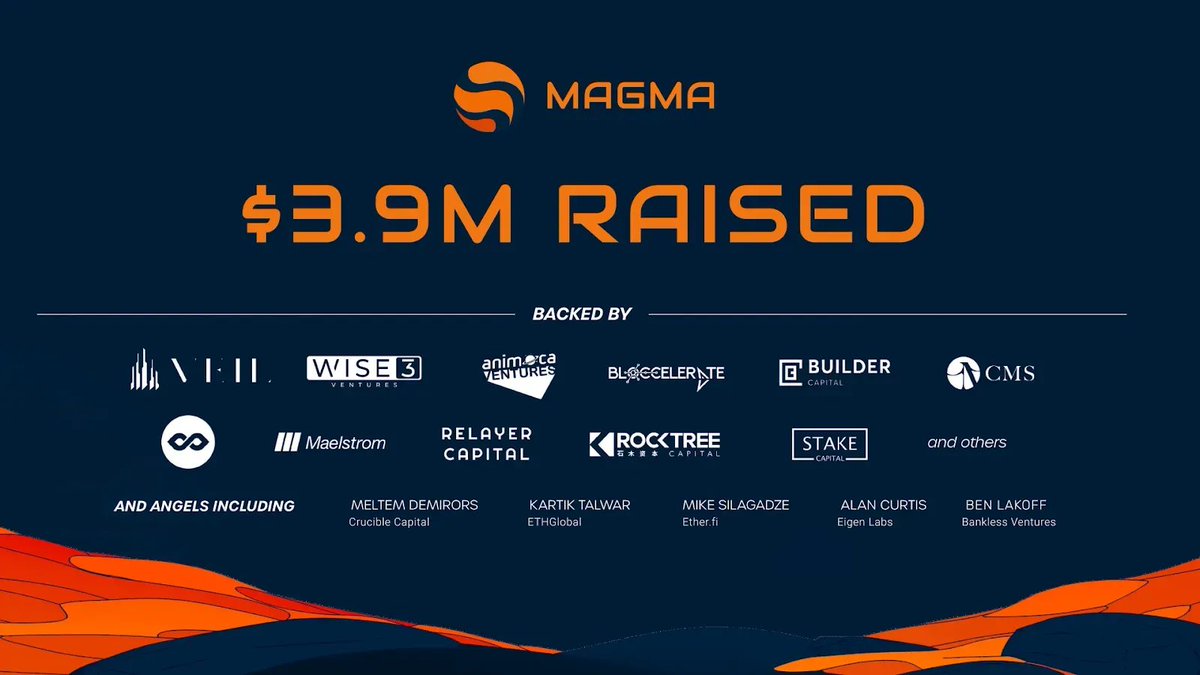
In October 2024, Magma announced the completion of a $3.9 million seed round financing, with investors including Bloccelerate, Animoca Ventures, CMS Holdings, Maelstrom, Veil VC, Builder Capital, Infinity Ventures, RockTree Capital, Wise3 Ventures, Stake Capital, and Relayer Capital. Additionally, this round attracted participation from several angel investors, including Meltem Demirors, Kartik Talwar, Mike Silagadze, Alan Curtis, and Ben Lakoff. The funds will be used to support the development of the Magma liquid staking platform and the construction of its maximum extractable value (MEV) architecture to enhance the functionality and efficiency of the Monad network. Furthermore, Magma plans to collaborate with Ether.fi to explore re-staking integration on Monad, further promoting the expansion of the ecosystem.
Magma's proposed Liquid Layer Theory aims to enhance the economic security of Monad by utilizing liquid staking pools. These mechanisms not only strengthen the network's security but also propagate it to the interconnect layer. Through these innovations, Magma hopes to provide a comprehensive and user-centric liquid staking solution that encourages community participation while contributing to the security and development of the Monad ecosystem.
Kintsu @Kintsu_xyz is a next-generation liquid staking protocol built on the Monad blockchain, designed to enhance liquidity, accessibility, and user participation in proof-of-stake (PoS) ecosystems.
Key features of Kintsu:
sMONAD and Capital Efficiency: Users receive sMONAD as a reward after staking their MONAD tokens through Kintsu. This liquid staking token (LST) not only represents the staked assets but also accumulates staking rewards over time. Unlike traditional staking, sMONAD maintains liquidity, allowing users to participate in various DeFi activities while continuing to earn staking rewards.
Enhanced Liquidity and Composability: Kintsu's LSTs can seamlessly integrate into DeFi protocols, gaming platforms, and other dapps within the Monad ecosystem. This composability allows users to maximize the utility of their staked assets, fostering a more dynamic and interconnected DeFi environment. Lending Platforms: sMONAD can serve as collateral in lending protocols, improving capital efficiency and providing users with additional revenue streams. Decentralized Stablecoins: sMONAD is an ideal collateral for decentralized stablecoins on Monad, contributing to the stability and growth of the DeFi ecosystem. Centralized Limit Order Book (CLOB) DEXs: Kintsu's LSTs enhance the liquidity and trading efficiency of CLOB DEXs, facilitating better price discovery and reducing trading slippage.
Decentralized Validator Registry: Kintsu maintains a decentralized validator registry to ensure that staking is distributed among diverse network participants, thereby enhancing the network's security and decentralization.
Integration with Automated Market Makers (AMMs): Kintsu's sMONAD can be used in AMMs on the Monad network, enhancing liquidity pools, reducing slippage, and improving trading efficiency. This integration not only creates higher returns for liquidity providers but also offers traders a more efficient market environment. Kintsu's innovative architecture provides users with a new way to participate in PoS on the Monad blockchain while injecting new vitality and possibilities into the entire DeFi ecosystem through its efficient liquidity management and decentralized design.
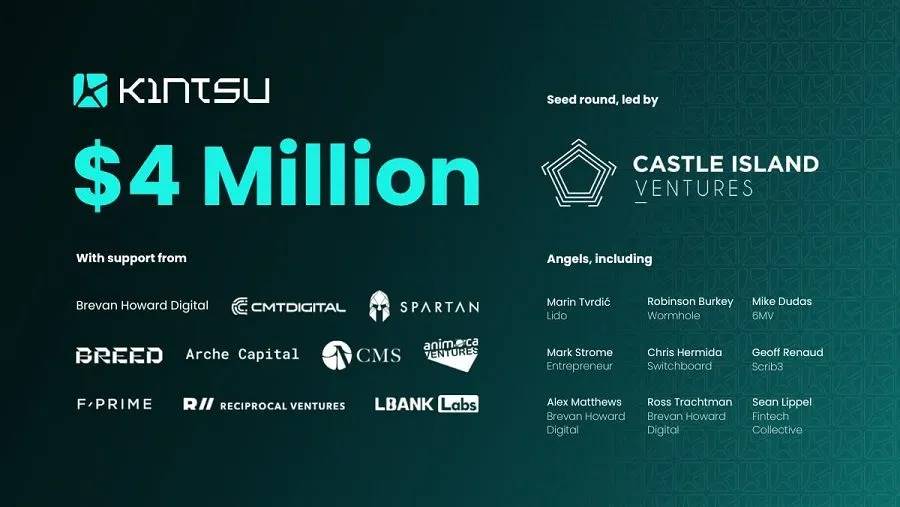
In July 2024, Kintsu successfully completed a $4 million seed round financing led by Castle Island Ventures. Other participating institutions included Brevan Howard Digital, CMT Digital, Spartan Group, Breed VC, CMS Holdings, and Animoca Ventures. At the same time, this round of financing attracted participation from several well-known angel investors, including Alex Matthews and Ross Trachtman from Brevan Howard Digital, Marin Tvrdic from Lido, and Robinson Burkey from Wormhole Foundation.
Kintsu provides a comprehensive solution to the many limitations present in traditional staking—such as insufficient liquidity and the inability to fully participate in DeFi activities—allowing users to retain flexibility and revenue potential while staking their assets. By deeply integrating into the Monad ecosystem, Kintsu's launch further enhances the vitality and efficiency of the Monad network, injecting new momentum into the development of Monad's DeFi ecosystem.
aPriori @apr_labs is a liquid staking protocol within the native Monad ecosystem that explores the combination of MEV optimization with liquid staking solutions. This approach aims to enhance network performance, potentially reduce gas fees, and provide sustainable incentive mechanisms for validators.
Core features of aPriori:
MEV-based Liquid Staking: aPriori combines liquid staking with MEV optimization, aiming to provide higher returns for validators and stakers. By capturing MEV more efficiently, aPriori hopes to improve overall yields while contributing to the economic stability of Monad.
Efficient MEV Market: aPriori is committed to creating an MEV market to reduce network congestion and spam transactions. By optimizing transaction ordering, the project aims to enhance user experience while promoting a more transparent and efficient way of extracting MEV, bringing potential benefits to the entire ecosystem.
High-Performance Architecture: aPriori leverages Monad's high throughput and parallel EVM environment to provide scalability and performance through its innovative architecture, meeting the growing user demand.
Integration with DeFi Applications: aPriori's liquid staking tokens (LST) are designed to facilitate interoperability with other DeFi applications in the Monad ecosystem. This approach not only enhances liquidity but also provides users with more opportunities to utilize their staked assets.
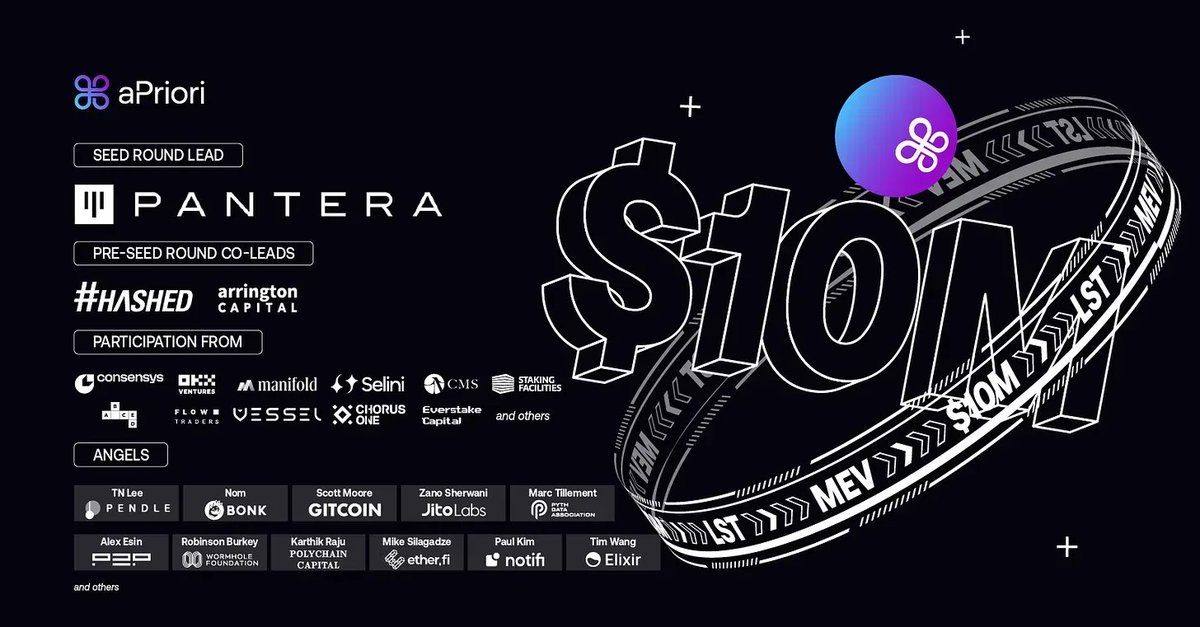
In July 2024, aPriori announced the completion of an $8 million seed round financing led by Pantera Capital, bringing its total funding to $10 million. This financing follows a pre-seed round co-led by Hashed and Arrington Capital, with funds allocated for team expansion, strengthening security measures, and promoting community engagement.
Institutional participants in this seed round included ABCDE Capital, Chorus One, CMS Holdings, Consensys, Everstake Capital, Flow Traders, Laser Digital (Nomura), Manifold Trading, OKX Ventures, Selini Capital, Staking Facilities, Vessel Capital, and others. Angel investors included Adam Jin, Alex Esin, Hongbo Tang, Karthik Raju, Marc Tillement, Mike Silagadze, Nom, Paul Kim, Rex, Robinson Burkey, Spencer Noon, Tim Wang, TN Lee, Zano Sherwani, and more.
aPriori is dedicated to advancing staking protocols through Monad's parallel execution environment while optimizing MEV and staking yields. By addressing the technical and economic inefficiencies present in traditional proof-of-stake (PoS) systems, aPriori positions itself as a contributor to the Monad ecosystem. Its design aligns with Monad's high-performance capabilities, aiming to bring tangible benefits to stakers, validators, and the broader Monad DeFi community.
More Native DEX Projects in the Monad Ecosystem:
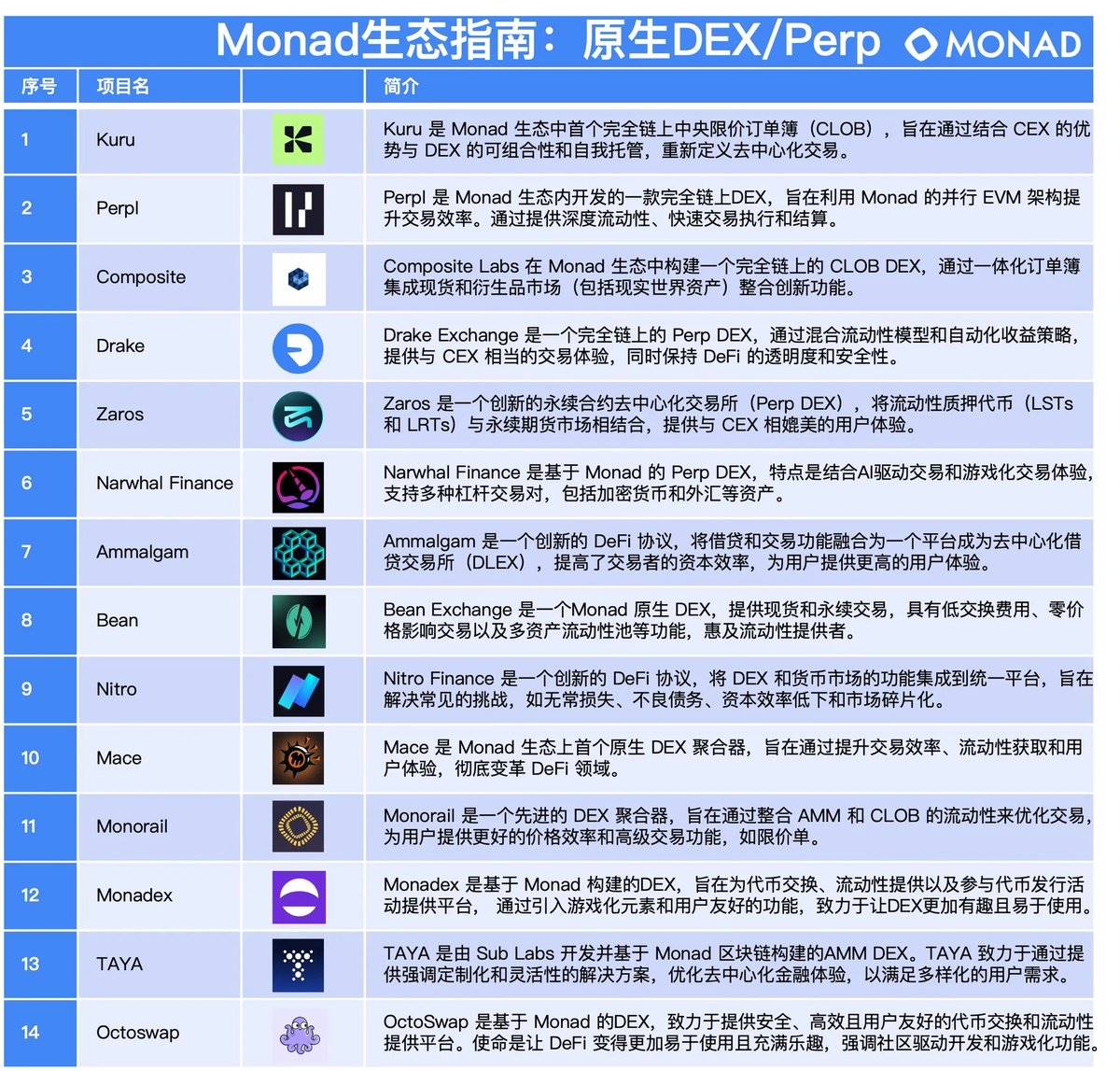
Perpl @perpltrade is a fully on-chain DEX developed within the Monad ecosystem, aimed at enhancing trading efficiency by leveraging Monad's parallel EVM architecture. By providing deep liquidity, fast trade execution, and settlement, Perpl is committed to addressing the speed and efficiency issues typically faced by traditional DEXs while maintaining a focus on decentralization and security.
Core features of Perpl:
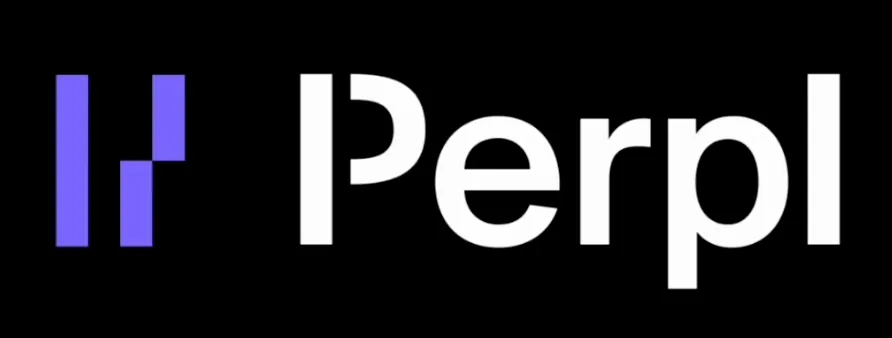
Deep Liquidity and Efficient Pricing: Perpl utilizes a native pricing engine designed to facilitate competitive on-chain market dynamics, providing traders with the best prices. This approach aims to encourage more on-chain asset issuance and promote community-centered distribution, thereby enhancing overall market efficiency.
High Performance and Scalability: Based on Monad's parallel EVM architecture, Perpl leverages the blockchain's high throughput and low latency characteristics to achieve fast trade execution and settlement. This infrastructure is designed to support a scalable trading environment capable of efficiently handling high transaction demands.
Enhanced User Experience (UX): Perpl emphasizes user experience by combining speed, efficiency, and an intuitive interface to meet the needs of both novice and experienced traders, simplifying navigation and trade execution processes.
Composability and Transparency: Perpl's open architecture is designed to facilitate seamless integration with other DeFi protocols, promoting composability within the ecosystem. This openness not only enhances transparency but also provides developers with opportunities to build innovative financial products on top of Perpl.
Perpl adheres to the philosophy of "no shortcuts," prioritizing decentralization, security, and user-centered design. By integrating with Monad's parallel EVM, Perpl aims to address challenges associated with centralized order routers and multi-signature control protocols, striving to create a trustless and highly resilient trading environment.
Perpl aims to drive the development of the Monad DEX ecosystem, providing a fully on-chain solution centered around deep liquidity, fast execution, and an intuitive user experience. Leveraging Monad's blockchain infrastructure, Perpl positions itself as a new benchmark for decentralized trading platforms, aiming to offer traders an efficient and reliable alternative to traditional exchanges.
Mace @mace_ag is the first native DEX aggregator on the Monad ecosystem, aiming to revolutionize the DeFi space by enhancing trading efficiency, liquidity acquisition, and user experience.
Core features of Mace:
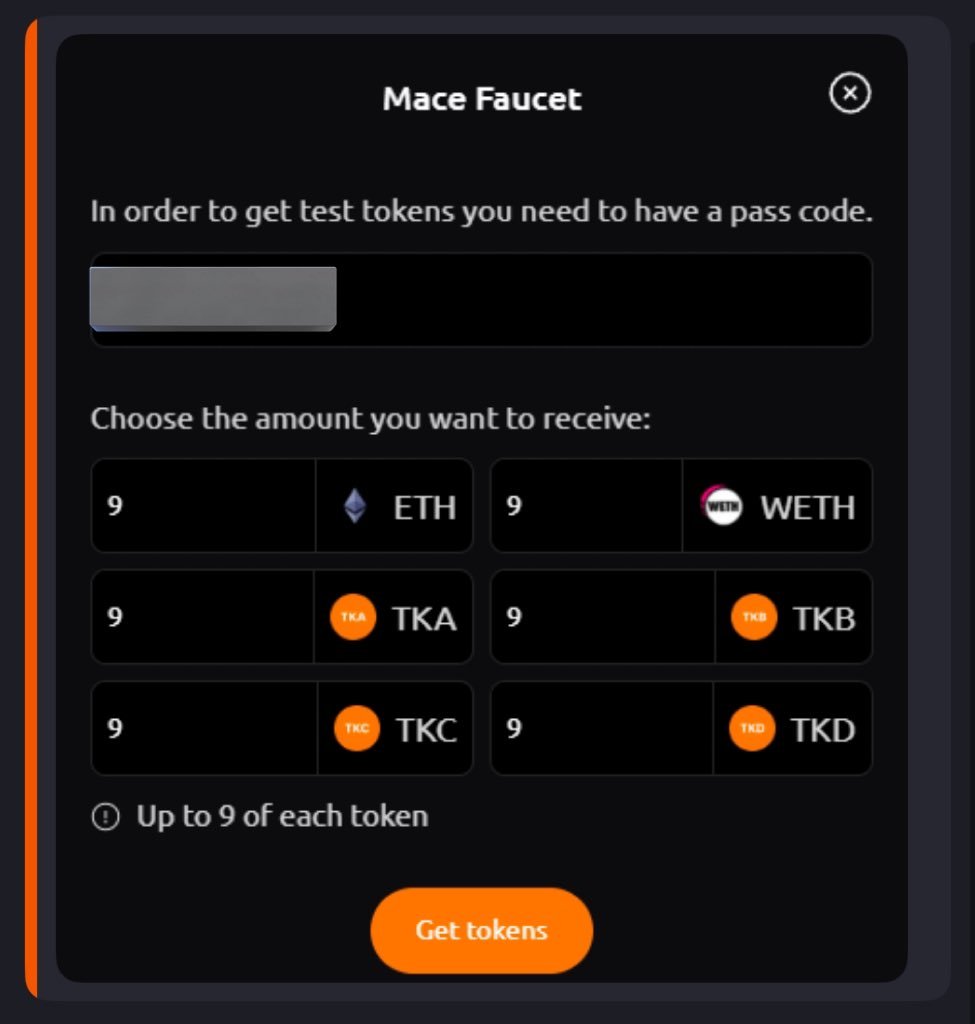
Comprehensive Liquidity Aggregation: Mace aims to integrate liquidity from multiple sources within the Monad ecosystem, providing users with efficient trade execution and solutions to reduce slippage. By scanning various liquidity pools, Mace seeks to identify the best trading paths and automatically allocate orders across multiple pools to enhance price efficiency.
Off-chain Cost Optimization: Mace utilizes a Rust-based backend system to execute computation-intensive operations off-chain, aiming to reduce on-chain gas fees. This approach processes transaction calculations off-chain, executing only the final optimized path on-chain, potentially improving transaction speed and ensuring calculation accuracy.
Integration with CEX Liquidity: Mace introduces off-chain liquidity from centralized exchange market makers using a Request for Quote (RFQ) system. This feature is designed for large trades of significant assets, aiming to improve capital efficiency and provide tighter spreads.
Execution Based on Monad's Parallel EVM: Leveraging Monad's parallel EVM architecture, Mace attempts to process multiple trades simultaneously to provide fast execution and minimize delays. This parallel processing aims to maintain exceptional performance even during network peak times.
Mace strives to cultivate an active community through its Points Program, which aims to reward users for their engagement on the platform. The protocol places a strong emphasis on security, employing a set of smart contracts to efficiently execute optimized trading paths. Additionally, Mace plans to launch a governance token to encourage community participation and create potential long-term value for token holders.
With the support of Monad's technological infrastructure, Mace aims to become a significant contributor to the Monad DeFi ecosystem, dedicated to providing users with a simplified, efficient, and cost-focused trading experience.
is a DEX built on Monad, designed to provide a platform for token swaps, liquidity provision, and participation in token issuance activities. Monadex aims to make decentralized exchanges more engaging and user-friendly by introducing gamified elements and user-friendly features, targeting both experienced traders and blockchain newcomers.
Core features of Monadex:

AMM with Customizable Features: Monadex's automated market maker (AMM) design supports customizable fee tiers, allowing pool creators to adjust fees based on the specific characteristics of their pools. Additionally, liquidity providers (LPs) can provide liquidity using a single token, simplifying the process and lowering the barrier to entry. Monadex also supports multi-asset swaps, enabling users to trade one asset for multiple others, or vice versa, enhancing trading flexibility.
Gamified Lottery System: Monadex integrates a lottery system within its AMM, where users earn lottery tickets through token swaps and can participate in weekly draws to win prizes. This feature aims to add a layer of fun and interactivity to the trading experience.
Governance and Community-Driven: Monadex positions itself as a community-centered exchange, committed to aligning with user values and the culture of Monad. Its governance framework is designed to empower the community to influence the platform's evolution, promoting an ecosystem-centric development model.
Monadex aims to become an important liquidity hub within the Monad ecosystem, providing convenient tools to help new users and developers more easily integrate into the ecosystem. By incorporating gamified features, offering flexible liquidity options, and promoting community engagement, Monadex is dedicated to creating a more interactive and accessible decentralized exchange experience.
is an EVM-compatible AMM decentralized exchange (DEX) that supports both concentrated liquidity market makers (CLMM) and traditional AMM models. By integrating a liquidity aggregator, TayaSwap aims to provide deeper liquidity for DeFi assets, thereby enhancing trading efficiency and user experience.
Core features of TAYA:
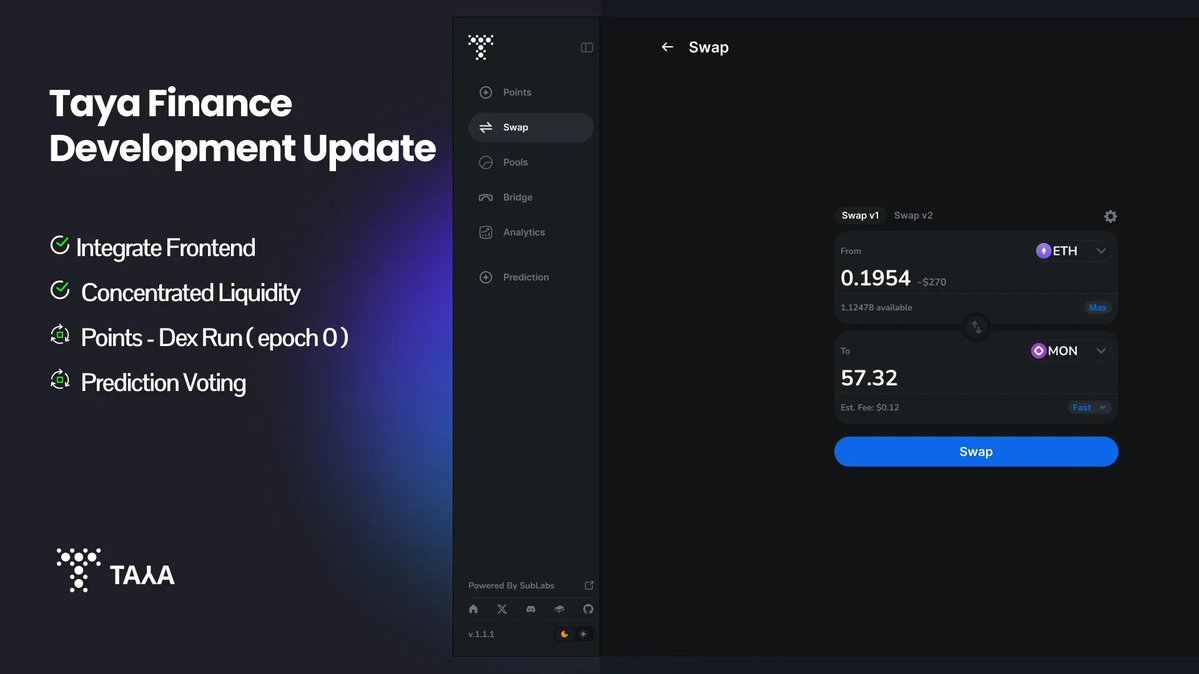
Prediction Market and Voting Features: TAYA introduces a design based on the pm-AMM model, specifically serving prediction markets and related voting mechanisms. This model aims to achieve seamless and fair prediction activities within the platform.
Customizable DeFi Solutions: TAYA's architecture supports user-customized financial products suitable for various application scenarios, such as Memecoins, KOLs (Key Opinion Leaders), and trading bots.
DApp as a Service (DaaS): TAYA provides a platform for creating customized exchanges without the need for programming skills. This feature aims to help users easily build customized exchanges, integrate with other platforms, and manage assets more efficiently.
TAYA aims to leverage Monad's high-performance blockchain infrastructure to provide a scalable and user-friendly DeFi platform. By focusing on customizable solutions and innovative features, TAYA hopes to establish its significant position in the evolving Monad DeFi ecosystem.
Octoswap @OctoSwapDex is a DEX built on the Monad ecosystem, dedicated to providing a secure, efficient, and user-friendly token exchange and liquidity provision platform. Its mission is to make DeFi more accessible and enjoyable while emphasizing community-driven development and gamified features.
Core features of OctoSwap:
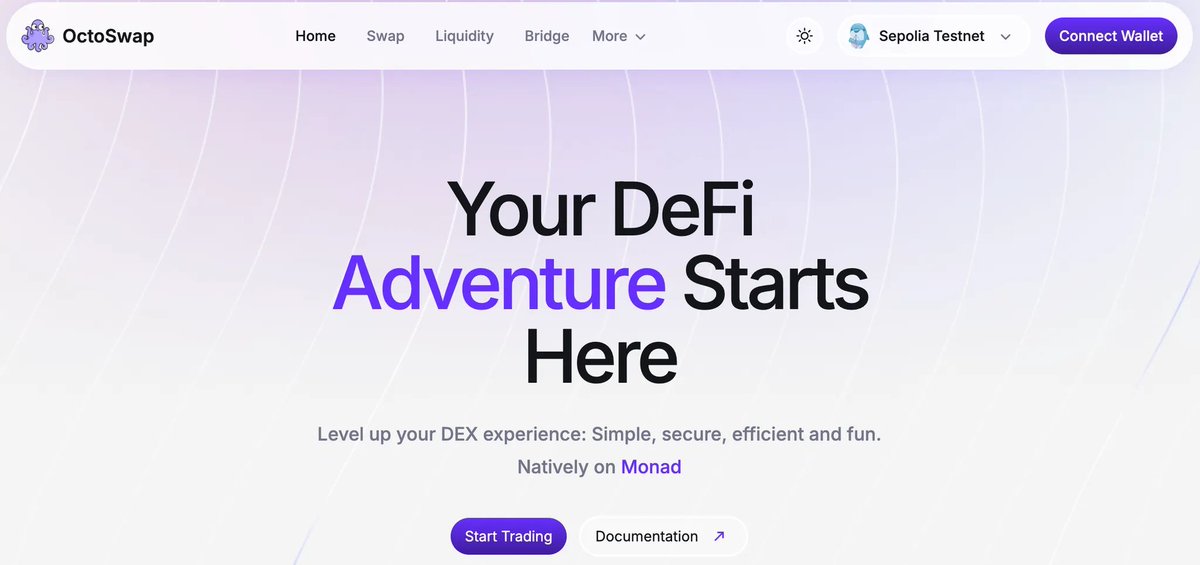
Instant Token Swaps: OctoSwap allows users to seamlessly exchange tokens with just a few clicks. The platform's streamlined process ensures fast, secure, and easy transactions, providing accurate pricing and low trading costs.
Liquidity Mining: Users can contribute liquidity to OctoSwap's liquidity pools by adding tokens, earning returns generated from platform trading fees. This feature incentivizes liquidity providers, enhancing the platform's overall liquidity and user engagement.
Gamified DeFi Experience: OctoSwap introduces unique gamified features aimed at making DeFi more fun and interactive. While specific details have yet to be announced, the platform emphasizes community participation and plans to integrate elements that reward user interaction and loyalty.
Based on Monad's high-performance infrastructure, OctoSwap leverages the speed and security of blockchain to provide users with a robust DeFi platform. Its user-centered design and commitment to community-driven development make OctoSwap an important player in the evolving DeFi ecosystem.
Conclusion
The native staking ecosystem of Monad is experiencing significant development, with projects like Magma, Kintsu, and aPriori exploring liquid staking solutions that leverage Monad's high-performance capabilities. These projects aim to meet user needs by improving user experience, enhancing capital efficiency, and introducing innovative staking mechanisms. As these initiatives progress, they are expected to make important contributions to the evolution of DeFi on the Monad network and network security.
We welcome more Chinese builders to learn about Monad's technological innovations and join our ecosystem. Below are relevant links and communities for Monad, and feel free to contact us at Gmonad.
免责声明:本文章仅代表作者个人观点,不代表本平台的立场和观点。本文章仅供信息分享,不构成对任何人的任何投资建议。用户与作者之间的任何争议,与本平台无关。如网页中刊载的文章或图片涉及侵权,请提供相关的权利证明和身份证明发送邮件到support@aicoin.com,本平台相关工作人员将会进行核查。



